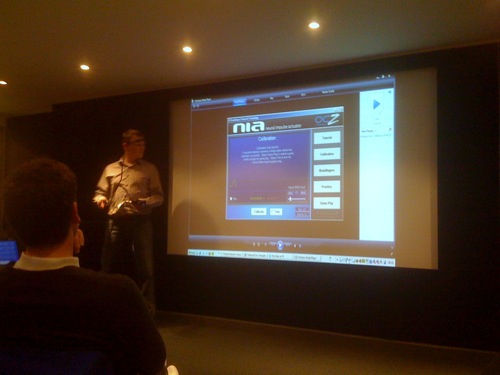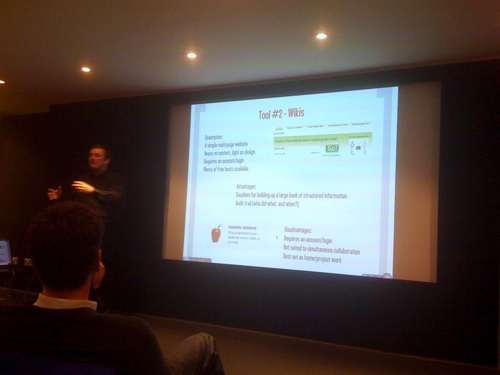 As regular readers will know, for the past couple of years I’ve been meeting up on a Sunday evening with like-minded educators to discuss all things relating to educational technology and e-learning. We’re far from being an exclusive group and, although we’re mostly from the UK, some do join us from further afield.
As regular readers will know, for the past couple of years I’ve been meeting up on a Sunday evening with like-minded educators to discuss all things relating to educational technology and e-learning. We’re far from being an exclusive group and, although we’re mostly from the UK, some do join us from further afield.
We’ve been on a summer break since the end of last academic year, but we start again tomorrow night, 30 August 2009 at 20.30 BST.
So make it your new (academic) year’s resolution to try and set aside an hour at 20.30 GMT/BST every Sunday evening to join us via FlashMeeting (meeting schedule here). More at edtechroundup.com!

Last night I attended my fourth TeachMeet – TeachMeet North East 09 – having previously been to the last two at the BETT show and TeachMeet Midlands 09 last month. It was held at the wonderfully-refurbished Tyneside Cinema, Newcastle-upon-Tyne. At the previous three TeachMeet’s I’ve presented either for 2 minutes or 7 minutes, but this time I decided to take a bit more of a back seat and be an ‘enthusiastic lurker’. 🙂
I met lots of people and came away with a few great ideas. These are the ones that stick in my mind:
Steve Bunce’s Neural Impulse Actuator

Without wanting to blow my own trumpet, usually things at TeachMeet I’ve either used in a different context or am planning to use. That is to say they’re ‘on my radar’. I was surprised and amazed, therefore, when Steve Bunce demonstrated a Neural Impulse Actuator last night. This takes the form of a band worn across the forehead that responds to muscle movements and brainwaves. Steve demonstrated fairly simple and straightforward applications using games and controlling bars.
Mark Clarkson’s Collaborative Tools

Prezi is a tool you either love or hate. It was used to great effect by Mark Clarkson in his 15 collaborative tools presentation. Lots of fantastic ideas in this presentation. Mark also created and co-authored an Etherpad document that took notes on everyone else’s presentations. 😀
Fergus Hegarty on ‘Real independent learning’
Unfortunately, I didn’t get a photo of the enigmatic Mr Hegarty. He presented on a ‘needs must’ situation where he recently completely revamped his teaching of Sixth Form Chemistry due to a massive teacher shortage in his department.
He spent hours getting all of the admin sorted for the rest of the course, ‘chunking’ and labelling the material needed. Students then organized their own time and decided which work they had to do when he was present (e.g. practicals) and things they could do during ‘independent learning’ sessions. This gave Fergus time to spend with groups of different abilities. Such approaches engender exactly the skills that are needed in young people – I just hope he gets the results so he can feel vindicated in his pioneering work! :-p
 If you’d like to view a replay of the TeachMeet, it was streamed live via FlashMeeting which created an archive of the event here (followed by an extension here)
If you’d like to view a replay of the TeachMeet, it was streamed live via FlashMeeting which created an archive of the event here (followed by an extension here)
 I spent yesterday afternoon with a like-minded group of educators who are part of the Becta-funded Open Source Schools project. We spent four hours (!) discussing the ins-and-outs of what educators want and need from us. We were joined virtually by a number of educators from the FlashMeeting (see replay). In the spirit of being open and sharing, here’s an overview of what was discussed! 😀
I spent yesterday afternoon with a like-minded group of educators who are part of the Becta-funded Open Source Schools project. We spent four hours (!) discussing the ins-and-outs of what educators want and need from us. We were joined virtually by a number of educators from the FlashMeeting (see replay). In the spirit of being open and sharing, here’s an overview of what was discussed! 😀
- We’re concerned with not replicating what is already available elsewhere in the Open Source community. Our focus should, and is, on pedagogical application of Open Source Software (OSS).
- Starting with the half-term after Easter, we shall have a ‘push’ in a given subject area. This will not be at the expense of providing resources, links and discussion for other subject areas. We have a number of historians who are part of the project (including myself), and so will be kicking things off with either History or Design and Technology, where teachers have also expressed a strong interest.
- The idea of ‘having a competition’ was raised at various points at the meeting. Usually it was in an attempt to get students engaged. I had misgivings about this, especially after Clarence Fisher’s excellent recent post.
- As would be expected, there was much discussion of Moodle. I’m not against it, I’m just not a huge fan. The problem is with Moodle is that there’s a fair learning curve, and it’s best deployed as a whole-school learning platform. I’m more concerned with getting teachers, students and parents using OSS they can install easily and locally. :-p
- I floated the idea of having posters that could be downloaded from the site and printed off by educators who want to promote OSS and the Open Source Schools website. We discussed getting professional designers to come up with these, but eventually decided that user-generated ones (after exemplars) would be more in keeping with the community spirit.
- I mentioned that a good way to get parents engaged might be to show ways in which they can control their children’s access to the Internet at home. We need to explore this more as existing OSS solutions we could think of are difficult to deploy on a single machine. I suggested OpenDNS, but it turns out that this is free, but not Open Source. 🙁
- We discussed how to get teachers started with OSS. I pointed out the fact that our unique selling point is pedagogical use of OSS, not just being a one-stop shop for everything Open Source! To this end, we’re not going to be providing step-by-step guides on how to download and install programs (unless we’re specifically asked to, of course…)
- It was agreed that video is a powerful medium, and that 5-minute TeachersTV-style examples of OSS being used in an educational context would be useful. This could take the form of screencasts (created using Wink, for example) or videos recorded and uploaded to Archive.org. These would be created by educators on a voluntary basis (after being seeded with some examples) instead of being of broadcast-quality by film crews parachuted into schools!
If you’d like to get involved in the Open Source Schools project, please head over to the website. We’re keen for as many people to get involved as possible and it’s far from an exclusive club.
See you over there! 😀
 As regular readers will know, for the past couple of years I’ve been meeting up on a Sunday evening with like-minded educators to discuss all things relating to educational technology and e-learning. We’re far from being an exclusive group and, although we’re mostly from the UK, some do join us from further afield.
As regular readers will know, for the past couple of years I’ve been meeting up on a Sunday evening with like-minded educators to discuss all things relating to educational technology and e-learning. We’re far from being an exclusive group and, although we’re mostly from the UK, some do join us from further afield.



 I spent yesterday afternoon with a like-minded group of educators who are part of the Becta-funded
I spent yesterday afternoon with a like-minded group of educators who are part of the Becta-funded